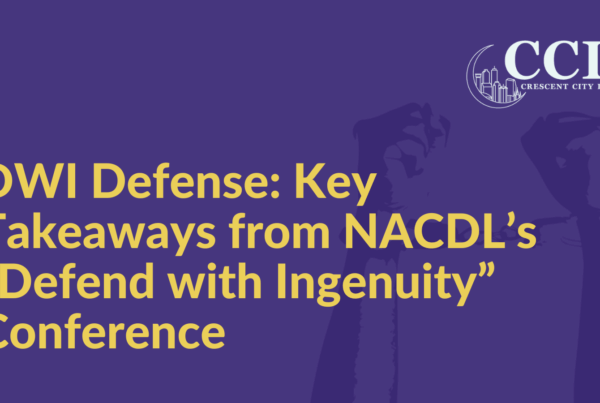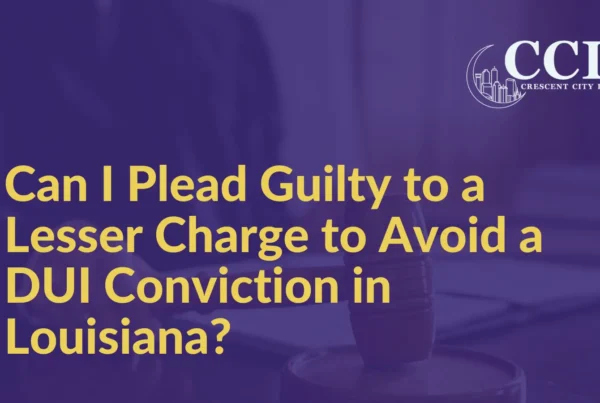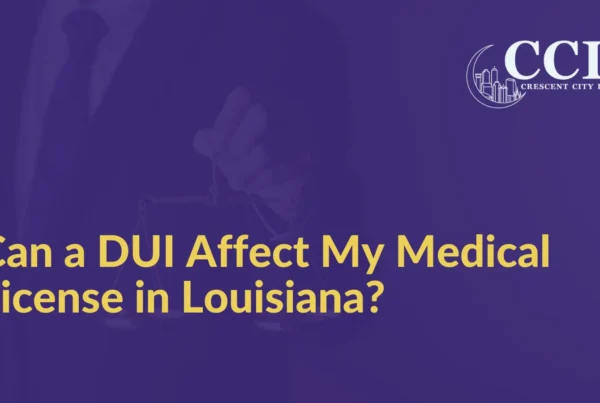Being arrested for driving while intoxicated (DWI) in Louisiana can change your life in an instant. What starts as a single mistake or lapse in judgment about DWI laws can lead to jail time, steep fines, loss of your driver’s license, and lasting consequences on both your criminal and driving records. If you or someone you love is facing a DWI charge, knowing the laws and penalties is the first step toward protecting your future.
At Crescent City Law, attorney John Radziewicz and our criminal defense team help clients across New Orleans and Louisiana navigate DWI cases with clarity and determination. We understand how overwhelming the process can feel, and we are here to provide guidance, advocacy, and a path forward.
Bail Restrictions After A DWI Arrest
Louisiana law places strict limits on bail for certain DWI-related arrests in accordance to DWI laws.
- Ignition Interlock Requirement (LSA C.Cr.P. Art. 320(C)): Anyone charged with a second or subsequent DWI, or a related offense, must have an ignition interlock device (IID) installed as a condition of release on bail. This ensures that while the case is pending, the driver cannot operate a vehicle while intoxicated.
- Restrictions On Recognizance Release (LSA C.Cr.P. Art. 321(C)(4) & 14): A person arrested for vehicular homicide or DWI with a prior conviction cannot be released on their own recognizance or on the signature of another person. In these cases, stricter conditions or secured bail are required before release.
These restrictions show how seriously Louisiana treats repeat DWI arrests and alcohol-related crashes. They also highlight why having an experienced attorney by your side early in the process is critical, as you need someone who can advocate for fair bail conditions while preparing your defense.
DWI Sentencing Guidelines
A DWI conviction in Louisiana carries more than just embarrassment, it comes with strict penalties designed to punish offenders and prevent repeat violations:
First Offense
- Fines: $300–$1,000
- License Suspension: 1 year
- Jail: 10 days–6 months (may be suspended if probation is granted)
- Probation Requirements:
- 48 hours in jail or 32 hours of community service (half litter abatement)
- Driver Improvement Program
- Court-approved Substance Abuse Program
- No driving without IID for at least 6 months during probation
- High BAC (.15–.199): 48 mandatory hours in jail, 2-year license suspension. An interlock is required during suspension
- Very High BAC (.20 or greater): All of the above plus fines up to $1,000 and 2-year suspension. An interlock is required during suspension
Second Offense
- Fines: $750–$1,000
- License Suspension: 2 years (up to 4 years for high BAC)
- Jail: 30 days–6 months (at least 15 days must be served and at least 48 hours must be served in parish prison)
- Probation Requirements:
- 240 hours of community service (half litter abatement)
- Court-approved Substance Abuse Program
- Driver Improvement Program
- Interlock Device required during suspension
- High BAC: 96 mandatory hours in jail and stricter suspension requirements
Third Offense
- Fines: $2,000
- License Suspension: 3 years
- Jail: 1–5 years (minimum 1 year without benefits, unless in a drug division probation program)
- Additional Penalties:
- Vehicle confiscation (at the discretion of the District Attorney)
- Probation for the remainder of the sentence, including home incarceration for at least 6 months
- Mandatory community service, substance abuse treatment, and Driver Improvement Program
If the defendant has already received parole, probation, or treatment before, penalties are even harsher, up to 5 years in jail and mandatory treatment based on DWI law.
Fourth Offense And Subsequent DWIs
- Fines: $5,000
- License Suspension: 3 years
- Jail: 10–30 years (minimum of 3 years without suspension of sentence)
- Mandatory Programs:
- Substance abuse treatment
- Driver Improvement Program
- At least 320 hours of community service
- Home incarceration
- Forfeiture of Vehicle
Louisiana considers a fourth DWI a felony-level crime, with penalties comparable to other serious offenses.
Other DWI-Related Violations
In addition to standard DWI penalties, Louisiana DWI law outlines several other alcohol-related violations that can carry serious consequences:
1. Operating A Vehicle Under Suspension For Certain Offenses (R.S. 14:98.8)
Drivers convicted of DWI who operate a vehicle during a suspension period face additional jail time (15–90 days), fines up to $500, and mandatory programs.
2. Home Incarceration And Treatment Requirements (R.S. 14:98.9)
Courts may require offenders to serve time under home incarceration and participate in intensive inpatient or outpatient substance abuse programs.
3. Court-Approved Substance Abuse Programs
Judges can mandate evaluation, inpatient or outpatient treatment, and participation in drug or DWI courts.
4. Community Service Requirements
Most offenders must complete significant hours of community service, with portions specifically designated as litter abatement.
5. Driver Improvement Courses
These courses are mandatory for most offenders and focus on traffic safety and alcohol awareness.
These added violations and programs emphasize that Louisiana doesn’t just punish offenders, it also aims to rehabilitate them and prevent repeat offenses.
Why Legal Help Matters
Even a first-time DWI can leave you with a criminal record, financial strain, and restrictions on your daily life. Multiple offenses carry life-changing consequences, from prison time to permanent license suspensions. That’s why it’s critical to have an attorney who knows the law, the penalties, and the local courts.
Contact Our Crescent City Law DUI Attorneys Today
If you or a loved one has been arrested for DWI in New Orleans or anywhere in Louisiana, don’t face the system alone. John Radziewicz and the team at Crescent City Law are here to protect your rights and fight for your future.
Contact us today at 504-608-0084 or contact us online for a free consultation.
FAQs
1. Can I Be Released On Bail After A DWI Arrest?
It depends on your history. First-time offenders may be eligible for release, but repeat offenders face stricter bail conditions, including ignition interlock devices. Prior convictions for DWI or vehicular homicide prevent release on recognizance.
2. How Long Will My License Be Suspended?
Suspensions start at one year for first-time offenders and can extend up to four years or more for repeat or high-BAC offenders. IID installation is almost always required.
3. Will I Go To Jail For A First-Time DWI?
Yes, but jail time can often be suspended if you complete probation requirements like community service and treatment. However, higher BAC levels carry mandatory jail time that cannot be suspended.
4. What Happens If I’m Convicted Of A Third Or Fourth DWI?
Third offenses bring felony charges, mandatory jail sentences, and potential vehicle confiscation. Fourth or subsequent DWIs carry fines up to $5,000 and up to 30 years in prison.
5. What Are Other Violations Connected To DWI?
Violations include driving under suspension after a DWI, failing to comply with court-ordered treatment, or not completing required community service. Each can bring additional penalties, fines, or jail time.
6. How Can A Lawyer Help Me With My DWI Case?
An attorney can examine every detail of your stop, arrest, and test results, challenge unlawful procedures, and negotiate with prosecutors. At Crescent City Law, we fight to protect your record, your freedom, and your future.






